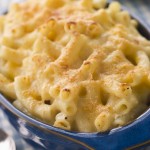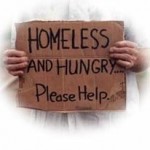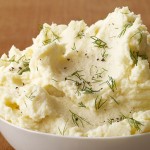Food is a nourishing way of bringing people together from a diversity of backgrounds. We can learn about and honour cultural traditions from all over the world in our own backyards. Crystal Randall, a graduate student at the University of Toronto, hosted a potluck at a Toronto InterChange meeting with the theme of how food builds peace. Delight in these stories that celebrate community, mutual fulfillment, and social justice through food.
Jenny Richmond Bravo
For tonight’s potluck, I brought macaroni and cheese because it’s my favourite comfort food. It makes me feel so good every time I eat it and it puts me in a peaceful state of mind. I also brought some appetizers: one is cucumber cups with taziki. I thought that would be good because they are so fresh and refreshing. They’re good for you, good for the environment, and all around good stuff! That same goodness is in my second appetizer: the fritters. They’re veggie with egg. The medley of carrot and onion together is delicious and colourful. Colour always brings so much to a meal. A meal is even nicer if it is visually appealing!
Scott Barnett
When I was growing up, I was pretty close to my grandma on my dad’s side. I would travel to Toronto every so often and spend a few days with her at her apartment. We would play Snakes & Ladders, cribbage, and euchre. I would eat lots of candy, stay up late watching TV, and do other things I wasn’t allowed to do at home.
My grandma would make bacon and eggs every morning, which was always a highlight of my trip partly because I really love breakfast and also because her bacon and eggs are the best ones I’ve ever tasted. She kept the bacon really rare, which is how I like it and then she would cook the eggs in the bacon grease so everything would taste like bacon. It’s hard to pull off that last part but she managed to do it. It was always lovely waking up in the morning and being able to smell breakfast. By the time you got up and went down the hall to the kitchen, breakfast would be ready.
There is not a lot of closeness within my extended family – I’m not really tight with anyone on my mom’s side and there aren’t very many of us on my dad’s side. My uncle has always lived out west; besides him it was just my grandma. I always loved going down to visit her. She passed away about ten years ago now and I’ve still never felt closer to any other relative. Maybe those breakfasts has something to do with it.
John Stephenson
I work downtown at Dundas and Sherbourne at a drop-in centre for homeless people. Food is peace in that it keeps people occupied and also provides them with a sense of security. I would say that the conversations I have with people at the drop-in centre revolve around three topics. One is the lack of security in the low-income apartments that some of our guests live in. Second is food, and third is sort of a miscellaneous category, whatever people want to talk about.
Food is vitally important because as soon as you take away someone’s ability to make their own meals it takes away some of their dignity. When people must go to shelters or to other food providers to eat, they don’t have a hand in cooking at all; they just eat the food given to them. However, access to food positively contributes to a sense of peace at the drop-in centre because it facilitates peaceful conversation. Dialogue is not about the crack addicts that are coming in and out of their building – instead people are talking about, “How did you cook this when you were a kid?” Also, addicts stay away from drugs when they’re eating or when they have money to buy food. Everybody goes to the food bank at the start of each month when they get their cheques. Having food keeps them active and healthy for a couple of days rather than spending money on their addiction and that contributes to peaceful existence.
We also have community meals where everybody wants to help. People come up to me and say, “John, what can I do?” These are the best times to get to know people because you’re doing something meaningful together: you’re bumping into each other in the kitchen, cooking together, and having the best conversations. It’s an hour or more before the meal and you get to chat with people that are in the kitchen with you. In addition, preparing a meal gives people something to do. I recall someone saying, “You know John, I haven’t had anything to do in the past couple of weeks and this has given me something to do even if just for an hour, and it makes me feel better because I am helping other people.” Food contributes to peace because it unites people.
Rodrigo Bravo
I brought mashed potatoes because mashed potatoes, as far as my own experience, are very universal. It’s a food that people can access in diverse parts of the world. It’s a food of the people and a food of families – a food that can be made together and eaten together whether in Santiago, Chile or here in Canada.
I’m a big fan of mashed potatoes because it is a dish eaten a lot in Chile. There are delicious Chilean foods: corn pies, empanadas, soups, and stews – definitely a strong culture that revolves around food. There are certain times of the year when you get together with your family to prepare and eat specialty foods but mashed potatoes are a constant that you can eat all year long. It is home-cooked comfort food.
I like mashed potatoes so much that I requested a dish to be served on my wedding day. I said that I didn’t care what I ate as long as I had mashed potatoes on the menu. And some amazing mashed potatoes were prepared exclusively for me, and I was very pleased about it!
Grace Karram Stephenson
Two years ago, my husband and I got a contract in the Fiji Islands running a study abroad program. The program paired American students with Fijian students. There we were, two Canadians – it was our first time trying to teach these students and trying to navigate the culture. So, we were paired with an older couple that farmed a coconut farm on the ocean, Uncle Bob and his wonderful wife, Sotia. They taught us a lot of different stuff. We just tried to adapt to the culture as best we could under Uncle Bob and Sotia’s guidance so that we didn’t offend people and we could blend in.
Until tonight I hadn’t really thought of how food builds peace. Whenever you went to someone’s house in Fiji, even if you only stopped by to ask when their boat was going the following morning to the next village or to ask your neighbour to pick up your mail, you would take them a loaf of bread, a can of tuna, a coconut or whatever you had – that’s the way it worked. When our American neighbour’s came to visit us they’d bring pickled carrots. If we walked 10 minutes away to snorkel on someone else’s beach we’d take them a can of tuna or a loaf of bread plus butter (it was this random New Zealand margarine). Usually, they’d serve us the bread and we’d all have tea together. That was how you made sure people knew you were coming. You wouldn’t say, “Oh, here’s your bread.” You’d connect by greeting, “Hi, how are you? We came to use the beach. How’s your mother?” You would offer the bread and it would be taken. Suddenly, the bread would come back on a platter!
Another example of food building peace was when we went fishing with the students. If we caught 10 fish, you’d automatically take three to the neighbour’s or to anyone who was in sight – if you saw someone you’d just take them a fish. This was the way we lived in community for that year.
By the end of the year, Uncle Bob was in a really ugly land dispute with his siblings. He was one of thirteen children. Three or four of his siblings came to his land, kicked off his daughter with five small children who were squatters, and said they wanted to sell the land to Americans to get a million dollar profit for it. In the midst of it all, Uncle Bob would buy his siblings groceries because as the youngest brother it was his duty to respect them. Imagine: his siblings kicked him, his daughter, son-in-law, and five small children out of their home and he was buying his siblings groceries! While he was taking legal action against them he was bringing them fish, and coconuts, and groceries regularly. In this way, food became a significant cultural act of peacemaking. You’d give someone food and you would make peace with them, somehow.
Lindsay
I brought snicker-doodles to the potluck. For those of you who don’t know, it’s a cookie. I got married this August after dating my husband for 4 or 5 years. During that time, his family and I had a very rocky history. Once we got married, we both tried to patch things up. One of the gifts his mom made me when we got married was a book of family recipes. This Christmas was the first Christmas being married, being in Toronto, and spending it with my husband because we’ve always gone home to Alberta to our own families in the past. We were alone, just the two of us, and we decided to make whatever we felt like making. We got to make our own food for Christmas for the first time, and so we were picking all our favourite family recipes. My husband insisted that I make snicker-doodles. I said, “What is that?” I had no idea! I phoned his mom and asked for the recipe. I made those cookies for him to honour his family’s tradition. For me, carrying on my husband’s family traditions into the life we are creating together reflects that we are both trying to create peace between our families.







Recent Comments